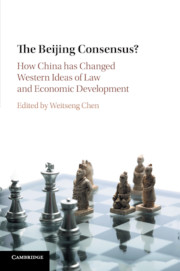Book contents
- Frontmatter
- Contents
- Figures
- Contributors
- Acknowledgments
- Introduction: Debating the Consensuses
- PART I Deconstructing the Beijing Consensus
- 1 Dialogus de Beijing Consensus
- 2 Imagining China: Brazil, Labor, and the Limits of an Anti-model
- 3 The Beijing Consensus and Possible Lessons from the “Singapore Model”?
- PART II Examining the Beijing Consensus in Context
- PART III Revisiting the Beijing Consensus
- Bibliography
- Index
3 - The Beijing Consensus and Possible Lessons from the “Singapore Model”?
from PART I - Deconstructing the Beijing Consensus
Published online by Cambridge University Press: 28 April 2017
- Frontmatter
- Contents
- Figures
- Contributors
- Acknowledgments
- Introduction: Debating the Consensuses
- PART I Deconstructing the Beijing Consensus
- 1 Dialogus de Beijing Consensus
- 2 Imagining China: Brazil, Labor, and the Limits of an Anti-model
- 3 The Beijing Consensus and Possible Lessons from the “Singapore Model”?
- PART II Examining the Beijing Consensus in Context
- PART III Revisiting the Beijing Consensus
- Bibliography
- Index
Summary
Introduction
China's model of development, often referred to as the ‘Beijing Consensus,’ involves a high degree of control for the state. Such control goes beyond economic planning and includes state-owned enterprises (SOEs) that are active participants in many sectors of the economy from manufacturing to services. The Beijing Consensus is often contrasted with the Washington Consensus which involved a set of ten policies that the US government and Washington-based international financial institutions – the World Bank and International Monetary Fund (IMF) – believed were necessary elements that developing countries should adopt to increase economic growth. The Washington Consensus, at its essence, placed emphasis on the importance of macroeconomic stability and the liberalization of the economy including reducing the role of the state. As the originator of the term, John Williamson, put it, the policies “may be summarized as prudent macroeconomic policies, outward orientation, and free-market capitalism.” It reflected a “neoliberal” set of economic reform policies as the term “neoliberalism” – which is used in a number of ways – is most commonly understood today. Scholars using the term in this manner typically characterize three sets of polices as being neoliberal: those that liberalize the economy by eliminating price controls, deregulating capital markets, and lowering trade barriers; those that reduce the role of the state in the economy, most notably via privatization of SOEs; and those that contribute to fiscal austerity and macroeconomic stabilization, including tight control of money supply, elimination of budget deficits, and curtailment of government subsidies.
However, even before the Beijing Consensus was coined as a term, the universality of the Washington Consensus, which was largely formulated in the context of economic problems in Latin America, was doubted. Part of the reason for this was that the recipe it prescribed led to economic chaos in some ex-Communist countries such as Russia. Another major reason was that it did not fit the development experience of some East Asian economies including Singapore. Although Singapore is not a communist or socialist country, at an early stage of her postindependence history Singapore embraced state capitalism and actively promoted the incorporation of companies – often referred to as government-linked companies or “GLCs” – to engage in various sectors of the economy. This was part of a two-pronged approach to achieve industrialization and GLCs continue to play an important role in Singapore's economy.
- Type
- Chapter
- Information
- The Beijing Consensus?How China Has Changed Western Ideas of Law and Economic Development, pp. 69 - 94Publisher: Cambridge University PressPrint publication year: 2017



